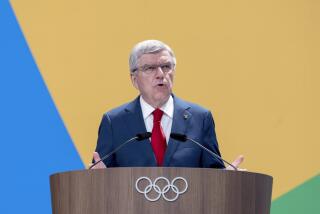Samaranch: Reuniting Teams Is Up to Germans : Olympics: IOC president arrives in Berlin for two days of talks. He says political reunification is not a factor.
- Share via
EAST BERLIN — The possible merger of the East and West German Olympic teams is a matter for Germans to decide and any agreement will be accepted by the International Olympic Committee, IOC President Juan Antonio Samaranch said Thursday.
Samaranch, who arrived in Berlin for two days of talks with Olympic and civic leaders from both Germanys, said he will attempt to determine what steps are being taken toward reunifying the teams.
East Germany’s Olympic chief, Joachim Weiskopf, said last weekend that the two teams probably will merge by the end of the year.
“Whether to have a unified team in 1992 is up to Germany. It is a German problem,” Samaranch said.
Weiskopf and his West German counterpart, Willi Daume, have said they plan to have one team for the 1992 Winter and Summer Olympics. Such a move would require IOC approval.
Samaranch said a merger of the Olympic committees would be approved even if political reunification of the two Germanys had not taken place by that time.
Political reunification is expected by the end of the year, although the rapid decline of the East German economy may push up that timetable. All-German elections are scheduled for early December.
A merger of the two German Olympic teams, which have competed separately since the mid-1960s, could rival the United States and the Soviet Union.
East Germany trailed only the Soviet Union in total medals at the 1988 Summer Olympics in Seoul, while West Germany was fourth. The Soviets had 132 medals, followed by East Germany with 102, the United States with 94 and West Germany with 40.
East Germany has been a world leader in track and field, swimming and winter sports such as bobsledding, while West Germany has top tennis players and is the World Cup champion in soccer.
More to Read
Go beyond the scoreboard
Get the latest on L.A.'s teams in the daily Sports Report newsletter.
You may occasionally receive promotional content from the Los Angeles Times.






